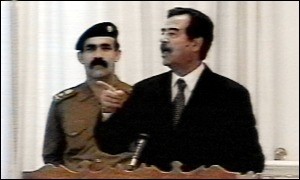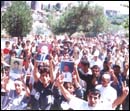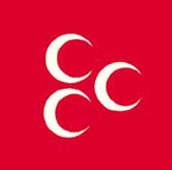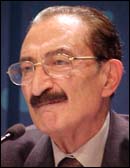13
March 2002
![]()
1. "Saddam renews Kurdish threats", the US and Iraq are both wooing the Kurds.
2. "Coalition government divided over minority rights question", bBetter for the PKK to be involved in politics than fighting in the mountains’
3. "Education in mother tongue would not divide Turkey: Arseven", there should be understanding and tolerance when issues such as the abolition of capital punishment and languages are discussed, the minister said.
4. "Coalition: Discord amid stability", MHP spells out its objections.
5. "We do not support an operation against Iraq: Ecevit", Turkish Prime Minister stressed that Turkey was still suffering from the adverse effects of the 1990-91 Gulf War.
6. "Preparing for elections", columnist Okay Gonensin comments on political parties' preparations for elections.
1. - BBC - "Saddam renews Kurdish threats":
The US and Iraq are both wooing the Kurds
By the BBC's Hiwa Osman / 13 March
Iraqi President Saddam Hussein has tried to reach out to the country's
Kurdish population amid speculation that their areas could be used by
the United States as it contemplates extending its war on terror against
Iraq.
n a speech on the 32nd anniversary of an historic agreement setting out the rights of the Iraqi Kurds, he said Kurds should not be deceived by "the foreigner", and should postpone their aspiration in the face of threats facing Baghdad.
But he added that he was not calling for dialogue with them - he did not want anyone "to have the illusion that this leadership is calling for dialogue because it is under futile threats".
A Kurdish politician described the speech as "unbelievable".
Kurdish regions in Iraq have been outside Baghdad's control since 1991.
Wooing
Trying to woo over the Kurds, Saddam referred back to the agreement of 11 March 1970, which had demonstrated the Iraqi people's "high level of maturity, ability and patriotism to solve their problems themselves".
He asked the Kurds to compare between the treatment they had received in Iraq and the fate of their brethren in neighbouring Turkey, Iran and Syria, adding that he did not have any problem using words like "our Kurdish people and Iraqi Kurdistan."
But, while urging the Kurds to gain their rights through dialogue, the Iraqi leader said: "When we see that Iraq is going through difficult times, we should postpone many things".
Dr Mahmoud Osman, a politician who led the Kurdish delegation at the 11 March agreement, told BBC News Online that Saddam's statement reminded him of the negotiations in 1991.
"They told us that the Kurds have to ask for less than 1970 because they entered two wars and that there was a conspiracy against them," Mr Osman said. "We were asked to pay the price of what the Iraqi regime did."
Threats
The Iraqi president's speech was not without warnings and threats.
"I say to the Iraqi people, and to the Kurds in particular, that Iraqis are clever, prudent and brave. The foreigner should not deceive them."
"We can disagree," he added. "But this should not put our powers at the service of the foreigners."
If the US were to extend its campaign against terror to Baghdad, a possible scenario would be to launch the attacks from Kurdish areas.
Saddam Hussein said that he was staying out of the Kurdish-controlled areas "not because of the foreigners".
Federalism?
In the jousting between Washington and Baghdad to win over the Kurds, the Iraqi president said his government was "the only regime that will realise everything every Kurd aspires to".
Iraqi Kurds have been pushing for a relationship with Baghdad that would be based on federalism.
This was declared in 1992 by the joint Kurdish parliament elected after the withdrawal of Baghdad's administration from the Kurdish region.
Concluding his remarks, the Iraqi president said there was nothing wrong with "discussing the improvement of the autonomy law".
Dr Osman saw this as "a mere tactic." "He
[Saddam] is only saying this because he is under threat. Once the threat
is removed he will use force again". ![]()
2. - The Daily Star - "Coalition government divided over minority rights question":
‘Better for the PKK to be involved in politics than fighting in the mountains’
Special to The Daily Star by Mohammad Noureddine /
March 12
With the March 19 date put forward by the Turkish government for
announcing its “National Program” designed to prepare
the country for European Union (EU) membership fast approaching,
a number of domestic arguments relating to accession have emerged almost
simultaneously.
Most of these arguments involve the offshoots of a single issue: the “Kurdish Question.” There is the argument over the death sentence passed on Kurdistan Workers Party (PKK) leader Abdullah Ocalan, and the one over teaching and broadcasting in the Kurdish language. Another, more recent, dispute revolves around whether it would be beneficial to allow the PKK to turn itself into a political party.
Ever since Turkey was accepted as a candidate for EU membership back in December 1999, all conditions put forward by Brussels in its “Accession Partnership Agreement” document seemed achievable including such thorny issues as settling the Cyprus problem. All, that is, except one: Kurdistan and the Kurds.
For Turkey, the Kurdish Question lies beyond the realm of wills and intentions. It is intimately connected to the very roots of Kemalist ideology, and touches on such sensitive matters as the nature of the Turkish nation state that was established in 1923 to replace the multi-ethnic Ottoman Empire. In this context, the Kurds are only seen as an integral part of the Turkish people.
According to sources in the Turkish Parliament, “even the problem of the army’s role in politics can be solved. But the army can never betray the ‘Turkish concept’ on which the state was built. Consequently, the army will never tolerate any form of broadcasting in Kurdish, for example, nor accept teaching in Kurdish.”
Yet the effects of the so-called “Kurdish factor” are not limited to cultural and linguistic issues. There is also a political dimension that is being increasingly discussed these days.
The majority of Turkish public opinion along with the country’s political and cultural elite believe the PKK, having lost its military teeth and with its leader imprisoned, is trying to achieve through politics what it failed to achieve in 15 years of violence. This much is obvious. The only difference is that during the years of armed struggle, the PKK called for the creation of an independent Kurdish state. Now, though, Ocalan is calling for a democratic Turkish republic in which Turks and Kurds live equally side-by-side. The republic Ocalan has in mind would do away with Kurdish urges for secession and/or independence.
Thanks to 80 years of Kemalist policies that denied the very existence of a Kurdish minority in Turkey, as well as to constant Kurdish rebellions against Ankara, an entrenched state of hatred and mistrust now exists between the two communities that cannot be easily eradicated. Nevertheless, a confidence-building process has begun in earnest, albeit under the pressure of EU conditions.
Columnist Taha Akyol wrote in Milliyet recently that “20 or 30 years ago, the term ‘Kurds’ wasn’t even mentioned in most Turkish dictionaries. When the Kurds made their great exodus to the Turkish border in the aftermath of the 1991 Gulf War, the Turkish media first called them ‘northern Iraqis,’ before settling on ‘Iraqi Kurds.’ Then-Prime Minister Suleyman Demirel’s recognition in the fall of 1991 of the ‘Kurdish reality’ was nothing more than rhetoric.”
Everything changed when the EU presented the Accession Partnership Agreement document. The Turks realized that they had to take definite steps to grant the Kurds their cultural rights. The document had the effect of boosting the courage of Turkey’s politicians and intellectuals to embark on a widespread discussion of the EU’s demands regarding the Kurdish issue. Discussing the Kurdish Question was no longer seen as a betrayal of Kemalist principles. This was a major turning point.
After Turkish society got accustomed to debating the use of the Kurdish language in education and broadcasting, voices began to be heard questioning whether the PKK should be allowed to operate as a political party under current legislation.
The idea behind these calls was to end the legend that had grown around the PKK. If the Kurdish party were allowed to contest parliamentary elections in Turkey, it wouldn’t be able to muster any real support from among the Kurdish community and would thus be exposed. This idea was propagated by Minister of State Mehmet Kececiler, a member of Deputy Prime Minister Mesut Yilmaz’s Motherland Party. Kececiler is one of the biggest advocates of easing restrictions on the use of Kurdish. “The Kurdish question,” he declared, “cannot be solved by prohibitions.”
In a recent interview with the Turkish newspaper Aksam, Kececiler was asked his opinion of the attempts to turn the PKK into a mainstream political party. The minister replied: “It is better for us to have the PKK involved in politics than fighting in the mountains. Why don’t you have confidence in our politicians? Why don’t you trust our Kurdish citizens? No one will vote for the PKK. We will beat them at the ballot box. Let them come. Under the existing laws, we will beat them fair and square. Kurdish parties that were de facto extensions of the PKK have already tried their luck in elections. Where are they now? Turkey’s entry into the EU will solve the PKK problem once and for all.”
Many Turks saw Kececiler’s words as an overt attempt to persuade Kurds, especially in the southeast of the country, to vote for his Motherland Party in the next elections scheduled for 2004. But nevertheless that doesn’t preclude seeing his comments as cracks in the wall of opposition to Kurdish rights.
In fact, Yilmaz himself said it was wrong to believe that using Kurdish would divide Turkey.
The Motherland Party leader also said that “by removing the obstacles that stand in the way of broadcasting and teaching in Kurdish, we are depriving terrorists and secessionists of a very important weapon. In this regard, Turkey needs more courage.”
As expected, Kececiler’s call for the PKK to be allowed into politics was bitterly attacked by the Nationalist Movement, one of the parties making up the ruling coalition. Ismail Kose, who leads the Nationalist bloc in Parliament, described Kececiler’s words as indicative of an “Ozal-style mindset” (the reference is to former President Turgut Ozal).
“It is thanks to this mindset,” said Kose, “that the country is in this mess. How can a government minister say such words? He has equated the Turkish people with the PKK.”
Meanwhile, Selim Ansarioglu, deputy leader of Tansu Ciller’s True Path Party, said Kececiler was talking nonsense. Motherland, Ansarioglu said, was preparing to become a partner with the Kurdish HADEP, itself an off-shoot of the PKK, in the next parliamentary elections.
For his part, Taha Akyol described Kececiler’s intentions as “good” but said he was going about the issue in the wrong way. Akyol said it was wrong for a government minister to call for a terrorist organization to turn into a political party.
Milliyet commentator Hasan Cemal, meanwhile, said that “calls for enabling the PKK to participate in politics are wrong; this will only serve to strengthen secessionists and all those who don’t want Turkey to be strong.”
But Cemal also called for “broad-minded policies vis-a-vis ethnic problems. Instead of marginalizing others, we should involve them in the political game.” Cemal called for the formation of a Kurdish political party that defends Kurdish rights, but at the same time respects Turkey’s unity.
The biggest surprise, however, came from exiled Kurdish leader Kemal Burkay, who accused HADEP of “trying to integrate with official ideology,” and the PKK itself of “never having a free will.” The PKK, Burkay said, “was always influenced by outside forces at the forefront of which was the Turkish state. Today, there is no difference to be discerned between PKK ideology and that of the state. Both are Kemalists and both support a unified Turkish state.”
The Turkish government hasn’t taken any practical steps yet to grant the Kurds their cultural rights. Yet despite that, and despite the fact that conventional Turkish thinking vis-a-vis this issue hasn’t changed, it has nevertheless been subjected to an unprecedented level of public debate.
In fact, the debates that have been going on concerning the death penalty, the Kurdish language, and the PKK indicate that Turkey is indeed standing on the threshold of a new era if Turkey is really serious in its efforts to join the EU and to be part of the European system of values that recognizes the cultural, and indeed political, rights of minorities.
Mohammad Noureddine is an expert on Turkish affairs
![]()
3. - NTV/MSNBC - "Education in mother tongue would not divide Turkey: Arseven":
There should be understanding and tolerance when issues such as the abolition of capital punishment and languages are discussed, the minister said.
March 13
The view that granting education rights for mother tongue languages
would lead to the disintegration of Turkey to be abandoned, according
to the State Minister Responsible for Human Rights. The way to win the
support of your citizens is not by imposing bans and setting obstacles
but by being in harmony with the modern world, said State Minister Nejat
Arseven, speaking at a panel on European Union relations Tuesday.
Arseven stressed that controversial issues such as education
and broadcasting in mother tongue languages and the abolition of capital
punishment should be evaluated with understanding. The minister slammed
recent calls to look into other alternatives than the EU and said that
no one was demanding that Turkey should replace its official language
with another one. When obstacles are lifted then a very important political
argument of the terrorist organisation would be taken away from them,
the minister said. ![]()
4. - Turkish Daily News - "Coalition: Discord amid stability":
MHP spells out its objections
ANKARA / 13 March
MHP objected to five of the 22 amendments the government intends
to make in a set of laws. The MHP objections are not to the essence
of the amendments, but rather to their timing. MHP wants the amendments
be done within medium-term pledges to the EU, rather than the short-term
pledges that Turkey is anticipated to complete by March 19
Package at Cabinet
The Cabinet is expected to handle the reform package this week, and after giving it a final shape is expected to dispatch it to Parliament early next week. The opposition of MHP on five of the 22 amendment proposals may trigger yet another confrontation between the MHP and ANAP
Prime Minister Bulent Ecevit's coalition partners may lock horns once again this week as senior coalition partner Nationalist Movement Party (MHP) has objected to five of the 22 amendments the junior coalition partner Motherland Party (ANAP) is pressing the government legislate by March 19, within the short-term pledges of the country to the European Union.
The MHP and ANAP are often at loggerheads over the reforms the EU has been demanding from Turkey.
State Minister Faruk Bal of the MHP presented to Deputy Prime Minister Husamettin Ozkan, the right-hand-man of Prime Minister Ecevit, the objections of his party, Tuesday, regarding five of the 22 amendments.
An examination of the MHP objections indicated that rather than objecting to the essence of the amendments to be made, the nationalist party is objecting to the timing of the reforms. If done within short-term pledges to the EU, Turkey has to complete the reforms by March 19 or so -- as Europe has told Ankara that there was no obligation to complete all the reforms pledged by Ankara by that date -- but if the changes are included in medium-term pledges, Turkey would have at least two more years to complete them.
The five objections of the MHP are:
1- The MHP is objecting to the amendment that restricts the jurisdiction of the Gendarmerie forces and allows the offices of governors and district administrators be run by acting officials. MHP defends that such an application would create problems in the administration of provinces and districts and create new bottlenecks. The MHP wants the government to totally scrap this amendment proposal.
2- The MHP objects to the changes to be made in the law on associations that would allow the establishment of ethnic and cultural associations -- such as Kurdish, Caucasian or Alewite. The party says that such a pledge was not among the short-term pledges of Turkey and proposes to undertake such a move within medium-term pledges. The MHP further states that the latest changes made in the civil law prohibited such discriminatory moves aimed at creating new "minorities" in Turkish society. The party suggests that when this issue will be handled within the medium-term pledges, the new arrangement must conform with the stipulations of the Lausanne Treaty.
3- Another amendment that MHP objects to pertains to the law on political parties. The MHP defends that the proposed amendment saying that before a closure decision against a party is given, the Treasury assistance given to it must be cut first, was not among short-term pledges, and that measures rendering difficult the closure of parties needed to be done within the medium-term pledges. The party wants the law on political parties be taken out altogether from the reform package, to be handled in accordance with the short-term pledges.
4- The MHP also objects to the amendment regarding restrictions on entry into the country and the distribution of published materials considered hazardous. The party wants the existing laws on that issue to remain intact.
5- The fifth objection of the MHP is regarding the lifting
of all restrictions on publication and broadcasting in languages other
than Turkish (i.e. Kurdish). The party particularly objects the stipulation
of the amendment that all restrictions on such languages in public demonstrations
and rallies be lifted. The MHP says that this issue could only be handled
within the medium-term pledges. ![]()
5. - NTV/MSNBC - "We do not support an operation against Iraq: Ecevit":
Turkish Prime Minister stressed that Turkey was still suffering from the adverse effects of the 1990-91 Gulf War.
March 13
Turkey’s Prime Minister has all but ruled out active backing
for a military strike against the regime of Iraqi President Saddam Hussein,
only days ahead of a visit by the US Vice President to drum up support
for such an operation.
Prime Minister Bülent Ecevit, speaking on CNN International, said that Ankara did not support a possible US-led military operation against neighbouring Iraq. Ecevit went on to stress that such an operation against Iraq would harm the Turkish economy, block the foreign investment and would bring ruin to the local tourism industry. These were the views that he would put to the US Vice President Dick Cheney during his forthcoming visit to Turkey, the Prime Minister said.
On Tuesday, Deputy Prime Minister Mesut Yilmaz also voiced the need to protect the territorial integrity of Iraq.
Ankara, striving to overcome the effects of the ongoing
economic crisis, not only has reservations over the financial implications
of a possible operation against neighbouring Iraq but also hold concerns
over the possibility of the establishment Kurdish state next door. ![]()
6. - Sabah - "Preparing for elections":
Columnist Okay Gonensin comments on political parties' preparations for elections. A summary of his column is as follows:
March 13
"Turkey's tripartite coalition government has been ruling the country for nearly three years. In the shadow of the economic crisis, it has managed to rack up many accomplishments and reforms in various areas by overcoming its inter-coalition frictions. However, still no improvement has been made on the basic economic problems, and the economic engine is not running smoothly. We've been told that the economy would begin to right itself this June. However, owing to the summer holiday, now all eyes have turned to this fall. The end of 2002 will be turning point for Turkish-EU relations.
The EU's declaration on beginning negotiations with Turkey for full EU membership, which hinges on the Cyprus issue, will spur preparations for elections in Turkey. On the other hand, if such a decision is not declared and if negative developments are seen on the Cyprus issue, it will also signal a start of an election period. When the election period begins, the coalition parties will have no more chances to make promises about the economy. The Democratic Left Party (DSP) and the Motherland Party (ANAP) will prepare themselves for elections with a vision of the EU, democracy and prosperity.
The Nationalist Action Party (MHP) has already begun to prepare its platform. Its slogan goes: 'No concessions to those who are trying to divide our country! Terrorists will be executed! Turkey will not surrender to Europe!" The True Path Party (DYP) has the advantage of being an opposition party and has tried to avoid an MHP monopoly on these topics. DYP leader Tansu Ciller is playing both sides: she defends the target of EU membership and at the same time, she stands close to the MHP regarding the capital punishment issue.
The Justice and Development Party (AKP) lacks a clear stance on critical topics. It resembles Ciller in its tendency to play two-sided politics. The Felicity Party (SP) seems to be a club of 'Erbakan lovers' with little chance in the race. The Republican People's Party (CHP), which champions EU membership together with social rights and social justice, cannot make its voice heard, since it is not represented in Parliament. It is occupied in attracting those disaffected from the DSP.
Additionally, on the center left at least two more groups
are trying to form a party and make it to the elections. The political
structure doesn't want early elections, and no one would dare touch
the Elections and Political Parties Law. So in sum, Turkey is heading
for a election period with only one issue on the agenda. And this will
last for at least one-and-a-half year." ![]()